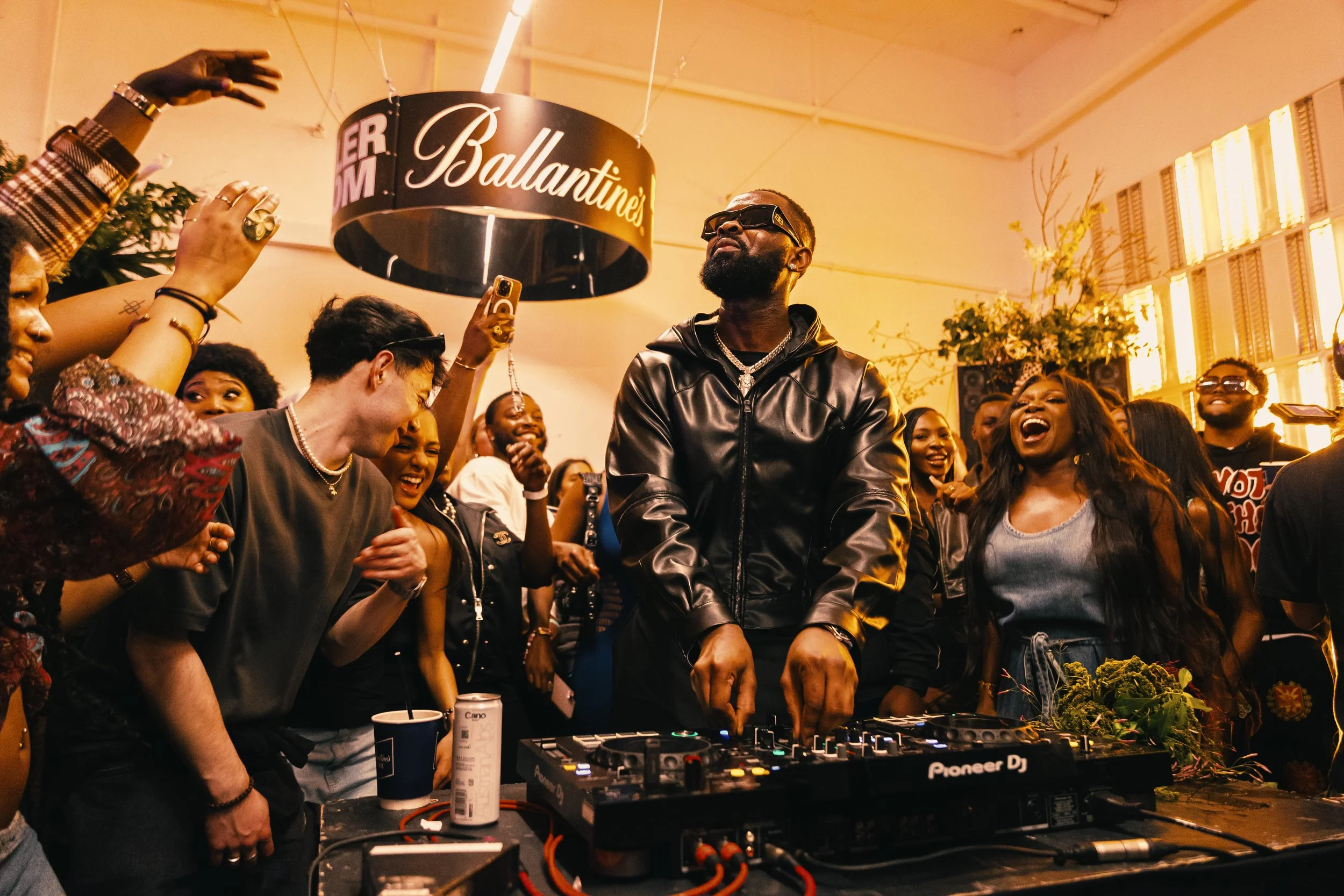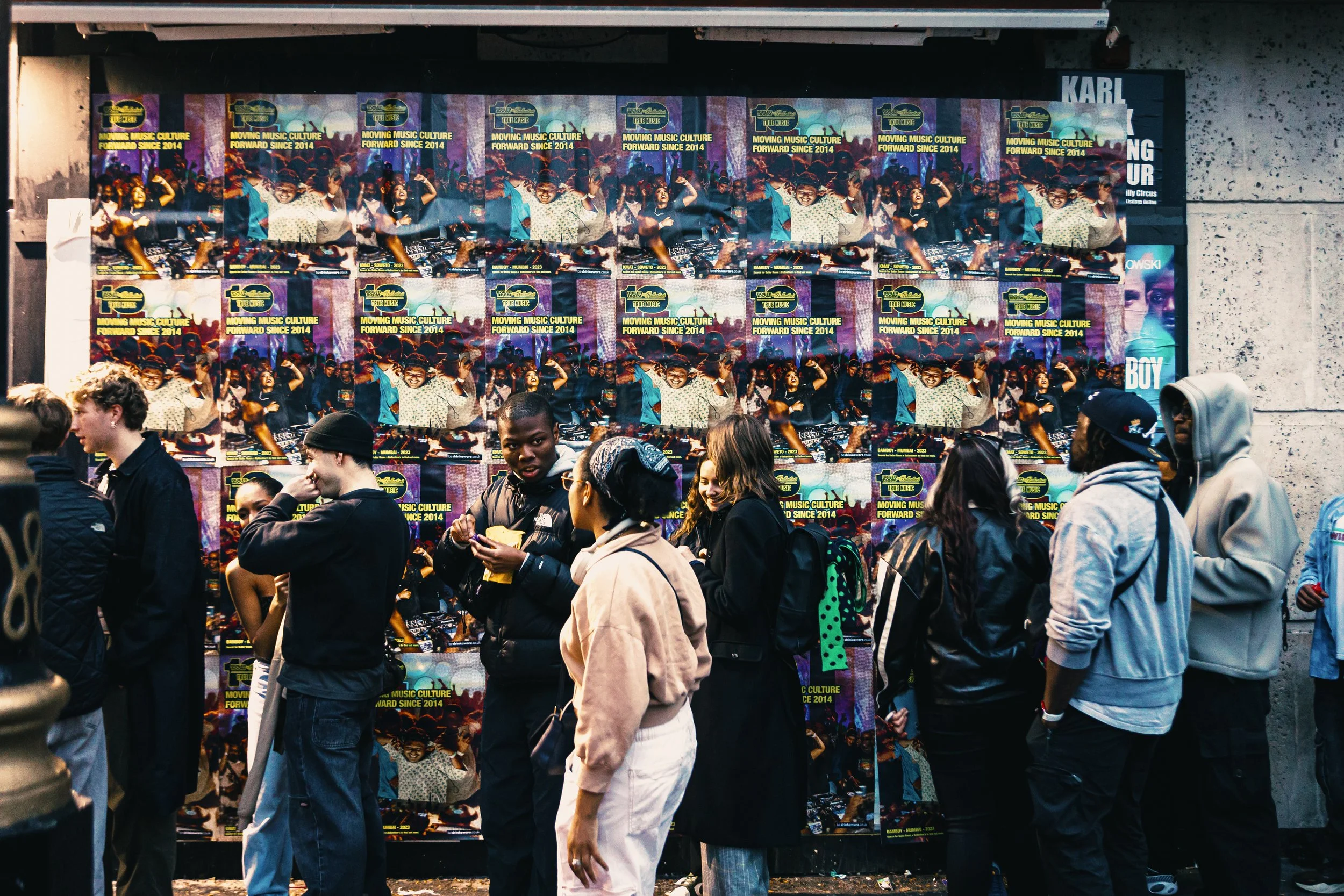Sarz, Hitmaker and DJ, Discusses New Music and His Partnership with Boiler Room and Ballantine's True Music 10
Meet the acclaimed Nigerian record producer and DJ and learn more about his production résumé and his tenure with Boiler Room and Ballantine's True Music 10.
Afrobeats is having more than a moment right now. In fact, right now is an understatement, considering the legacy building we've witnessed and will continue to witness.
Withstanding the test of changing music trends and fluctuating nightlife after the pandemic, this vibrant, sweet, and playful genre has become the soundtrack to many days and nights out in London.
Taking off in the mid-2010s, Afrobeats has found itself on a global stage both in the UK and the US, with its pioneering artists safely at the forefront and guiding its success. London, in particular, has its own relationship with Afrobeats that feels natural; the city boasts a vast African diaspora, and we've seen the emergence of fusion genres such as Afroswing. However, in recent years, African American audiences and artists have shown appreciation for Afrobeats, too.
At the centre of its success, you'll find trailblazing producer and DJ Sarz, and he's nobody's mate. He's responsible for hits such as the Lojay-assisted "Monalisa", Niniola's "Maradona" (elements of which found their way onto Beyoncé's "Find Your Way Back"), Skepta and Wizkid's "Energy"—and most recently, "Happiness" featuring Asake and Gunna.
Boiler Room and Ballantine's True Music partnership is always at the forefront of platforming, uplifting, and archiving new music. You'll know Boiler Room as the world's biggest broadcaster of new underground music and Ballantine's as an award-winning Scotch whisky brand, but together, their True Music platform was born out of a desire to spotlight local music scenes on the global stage. From Russia's techno beats to South Africa's Amapiano revolution, they've given music lovers access to some of the most exciting artists worldwide.
As Boiler Room and Ballantine's celebrate their tenth anniversary with ten in-person and broadcast True Music 10 events, we caught up with hitmaker Sarz to discuss his True Music 10 performance in London, his influences, Sarz Academy, and the international trajectory of Afrobeats.
The Culture Crypt: What made you want to join Boiler Room and Ballantine's True Music?
Sarz: "I've always wanted to be a part of the Boiler Room movement because they're so inclusive with, you know, culture and diversity and all kinds of music. And it's such an excellent platform for every DJ. All of our favourite DJs have been there at some point. What other opportunity is there to do this other than Ballantine's and Boiler Room?"
How do they fit together, and how do you see yourself fitting within this?
"It's easy. They're very inclusive of different cultures and skin colours—I didn't feel awkward or that I didn't fit."
You just recently had the pop-up True Music 10 event in London. How was that?
"It was amazing. It was my first real pop-up in London, and I didn't know what to expect, even though I know London is one of the biggest hubs for Afrobeats and Amapiano. It was so exciting, and the energy in the room was unreal. It’s so great to see people consume and understand the music, and the energy translates."
I was going to say there's a huge African diaspora in London. Do you ever feel like the vibe is different or that you'll need to change elements of your set? Or do you see what the vibe is and go from there?
"Um, not really. I think now more than ever, mainly because of the music, Africans in the diaspora have embraced their culture even more, so it's easier to be more authentic, especially in the last eight to ten years. I mean, they liked the Afrobeats, but you'd have to water it down to a level that is understandable. But now they actually really like the undiluted Afrobeats just the way we like it in Nigeria."
When you think of True Music 10, what's been the highlight for you?
"The energy from the show itself was special. It was just a night of seeing different people from all walks of life having a good time."
If you could have done another True Music 10 Boiler Room x Ballantine's gig, where would you have liked to have performed?
"Just because I've never been, and I want to go so bad, South Korea or Japan."
The clubbing and nightlife scene plays such an important role in how music circulates. Why do you think Afrobeats and Amapiano have managed to become so popular globally?
"For starters, I'd say we have hubs all around the world. There are Africans in the diaspora everywhere. Whatever resonates in Africa or Nigeria is being transferred to all these hubs. The boom of streaming also really helped Afrobeats get global recognition. Collaboration as well, collaborating with other acts just to increase the reach of the genre."
And I guess with performances like these, you get to archive the performance which adds to the longevity
"Yeah, I completely agree."
This collaboration between yourself, Boiler Room and Ballantine's feels like a natural progression from the Sarz Academy you started in 2015, so for those who don't know can you tell us a little bit more about that?
"I started an academy in 2015 for producers and artists like myself because I had no one to look up to or mentor me when I was coming up. So, I set up the academy to give back to the community and help people achieve the things I have, and even greater, in a shorter time than I have."
And how have you balanced your own success whilst helping others at the same time?
"I don't think of it like a balance, everything is just a part of me. I'm intentionally trying to help people; I think naturally, I'm just a giver, and it's a blessing to see people being blessed... It's not something I think about. I never had my processes or anything. It just comes naturally to me."
With emerging African hubs and audiences in the US, what's your experience or process been like collaborating with US artists?
"For me, it's no different from collaborating with any other artist anywhere in the world. And this is just me speaking from my own experiences. All the collaborations I've done with American artists have been very organic in the sense that they are moved by the music, hear the music, and want to do it; it's never forced."
As Afrobeats becomes more international, do you kind of worry about it losing its roots?
"No, because there's still so much happening in the continent that the world doesn't know about, but it's also great that a part of Afrobeats is reaching the very peak of music. I don't think it will lose its sauce or its originality; let people take things they like and use them in the way they want to use them. There are so many things that we, as Africans, are enjoying from other cultures and are taking them as our own and using them. I think that's the beauty of bringing value or bringing something to the world."
I think because it's so rooted in culture, it's not something just anywhere could replicate
"Yeah, it would always be—that's the kind of music we like in Africa, it would always resonate there, even if there comes a time when Afrobeats isn't at the forefront globally it would still resonate in Africa."
How does your role as a producer contribute to the international success of Afrobeats? I've noticed you tend to take elements from other genres and infuse them into your songs. "Beat of Life" with Wizkid felt quite EDM-inspired
"I listen to different types of music, different genres of music, and I'm inspired by different things, and subconsciously those things come up when I'm making music. But I also think about how to bring worlds together, how to bring people together through my music. So that's why I'm very inclusive of different genres.
It's so exciting. I just kind of piece different genres together and put it out from an African perspective. It's always interesting to see what the outcome of that is. It makes other listeners or other creatives see how they can be inclusive in our genre as well because sometimes people will love Afrobeats, but they don't know how to enter the world because it's so new to them. So I think, you know, some of my music brings a better perception [of Africa]."
You're putting out your first album soon. What can we expect?
"This is my first album, and it's going to be my best body of work yet. And I have so many collaborations with people I love to work with and people I admire. I wish I could say more, but I can't."
Watch Sarz's DJ set below:



